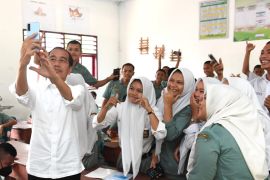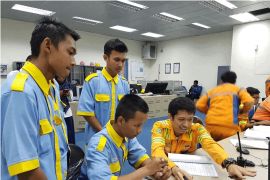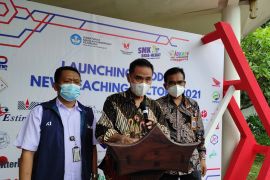"We need millions of skilled human resources, so Kadin can help improve the quality of education in vocational schools," Jokowi said.Jakarta (ANTARA News) - President Joko Widodo (Jokowi) said students of vocational schools need to be taught not only regular lessons, but also more specific technical subjects.
By teaching specific technical subjects to the students of vocational schools, they can master those skills and be more competitive in the real world.
While inaugurating the National Conference on Education and Culture at the Jakarta International Expo (JIExpo) in Kemayoran, Jakarta, on Thursday, Jokowi said he would set his focus on vocational schools and advised them to teach specific subjects to the students.
The president said it was important to focus on specific subjects, such as how to make a video or an application, in light of the rapidly changing world.
If the change was not anticipated, as a result of which students of vocational schools were ill-prepared due to a lack of specific skills, the president believed they would fall behind in this competitive world.
The president revealed that 42.5 percent of the workforce in Indonesia today were just primary school graduates. The rest were junior and senior high school graduates.
"I must present this condition as it is, and this should be homework for our education institutions to adequately prepare our human resources," the president noted.
Further, the president requested that the facilities and infrastructure of vocational schools be improved.
While launching the 2016 Indonesian Chamber of Commerce and Industry (Kadin) Leadership National Meeting at the Borobudur Hotel earlier in December, Jokowi asked Kadin to help improve the quality of education in vocational schools across the country.
"We need millions of skilled human resources, so Kadin can help improve the quality of education in vocational schools," Jokowi said at the time.
The president stated Indonesia will benefit from a demographic bonus after 2020 when the number of people of productive age will be higher than the number of elderly and children.
The younger generation should continue to build its capacity and capabilities in accordance with any formal and non-formal education they acquire. Only then will Indonesia be able to take advantage of the demographic bonus.
This demographic bonus will help in the development of the creative economy in the country.
"The greater the number of people of productive age in Indonesia, the more internet users we will see. This will increase our creative ability and throw up new ideas to create value-added products of high quality," he said.
In light of this, Jokowi noted that the quality of education needs to improve, not only to expand the capabilities of human resources, but also because doing so will boost Indonesias morale while competing with other countries.
The head of state explained that the business realm, through Kadin, can play an important role in improving human resources capabilities to meet the needs of the industry through vocational schools.
In response, Kadin chairman Rosan P Roeslani said Kadin would support the governments efforts to improve vocational education by taking advantage of the demographic bonus to boost economic growth.
Maximizing the effectiveness of vocational education is also required to allow vocational school graduates to learn skills that match the needs of the industry, so they are better prepared to work in the manufacturing sector.
In addition, the president asked the relevant ministries, including the Ministry of Higher Education and Culture, and state-owned companies to cooperate in the establishment of millions of vocational schools and vocational training centers and to encourage the private sector to take part in the program.
"The private sector is also expected to take part in this program, particularly in vocational training, so that it can be set up in other regions as well," the president declared.
The head of state noted that if the program was only executed by the government, it would be impossible to establish millions of vocational schools and vocational training centers.
"If we do it alone, let alone if it is done solely by the BLK (the governments vocational training center), it will be impossible to create millions of vocational training centers," he remarked.
According to Jokowi, to achieve this goal, a policy was needed to issue a regulation that would facilitate the private sectors entry into this field.
To improve the quality of higher vocational education and training to help young people find work, Indonesia is aiming at revitalizing numerous universities in the country.
As part of wider efforts to improve the relationship between the labor market and education, the revitalization is expected to enhance the content and quality of higher vocational and technical education through the development of knowledge, skills and competencies.
According to Research, Technology, and Higher Education Minister Mohamad Nasir, the number of vocational students in Indonesia is only 5.6 percent of the total students, much smaller than that in other countries.
The minister stated that in Austria, for example, vocational education and training (VET) is very popular among the youth, with nearly 80 percent of students choosing this field following graduation from school.
It combines mainstream education and vocational training with practical training for 14 to 19-year-old students.
The education sector in Austria is varied and flexible, with horizontal mobility always an option for tertiary education.
In light of this, Mohamad remarked that the Ministry of Technology and Higher Education would in 2017 revitalize some 12 universities across the country by improving quality control in the VET sector and enhancing career guidance for young people to boost their job prospects.
He said the revitalization of these universities would be undertaken to improve the quality of higher vocational education in the country to fit the needs of the industry by introducing specific curricula.
The improvement of vocational education aims to help learners compete at the global level and meet the challenge of globalization.(*)
Reporter: Otniel Tamindael
Editor: Heru Purwanto
Copyright © ANTARA 2017











